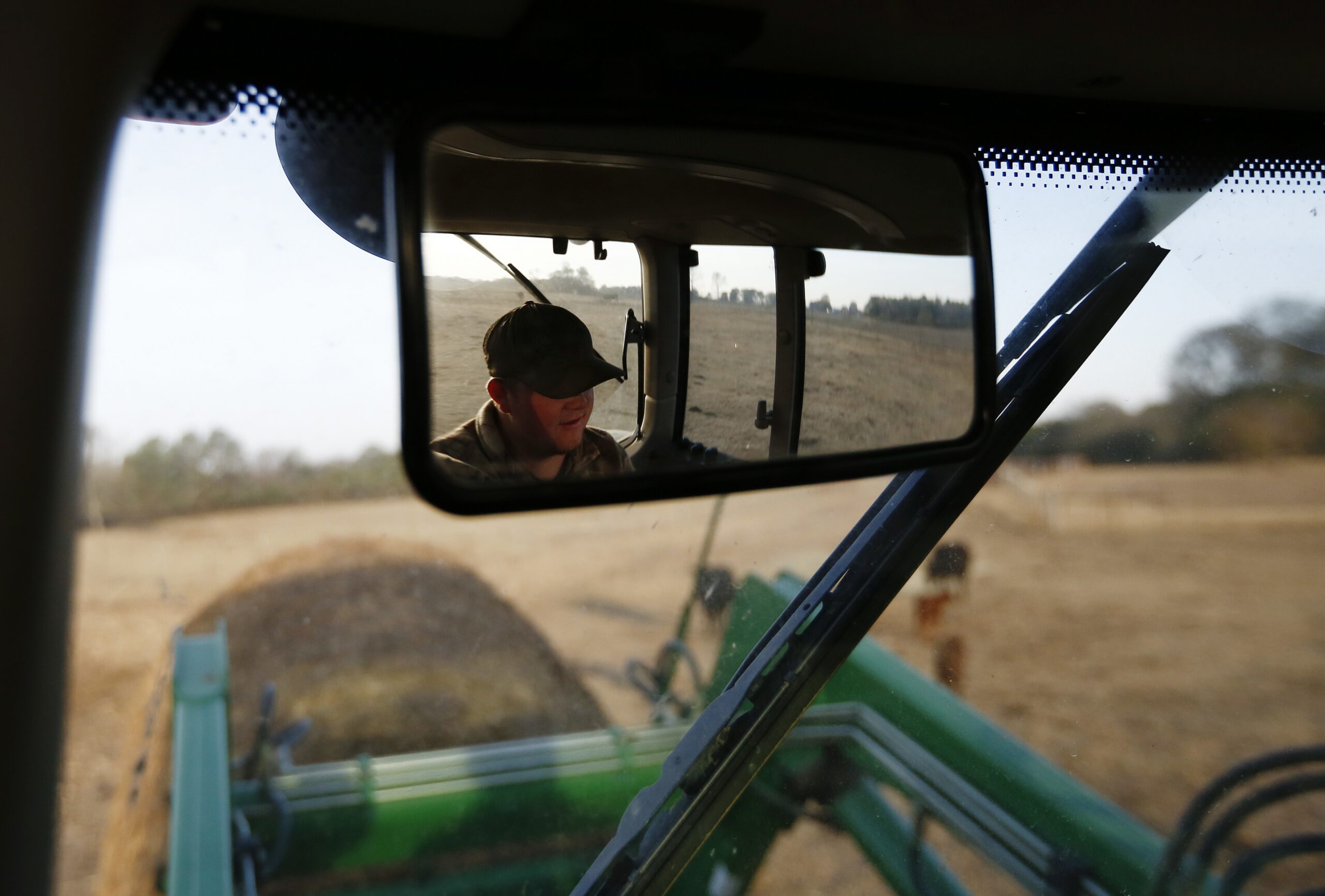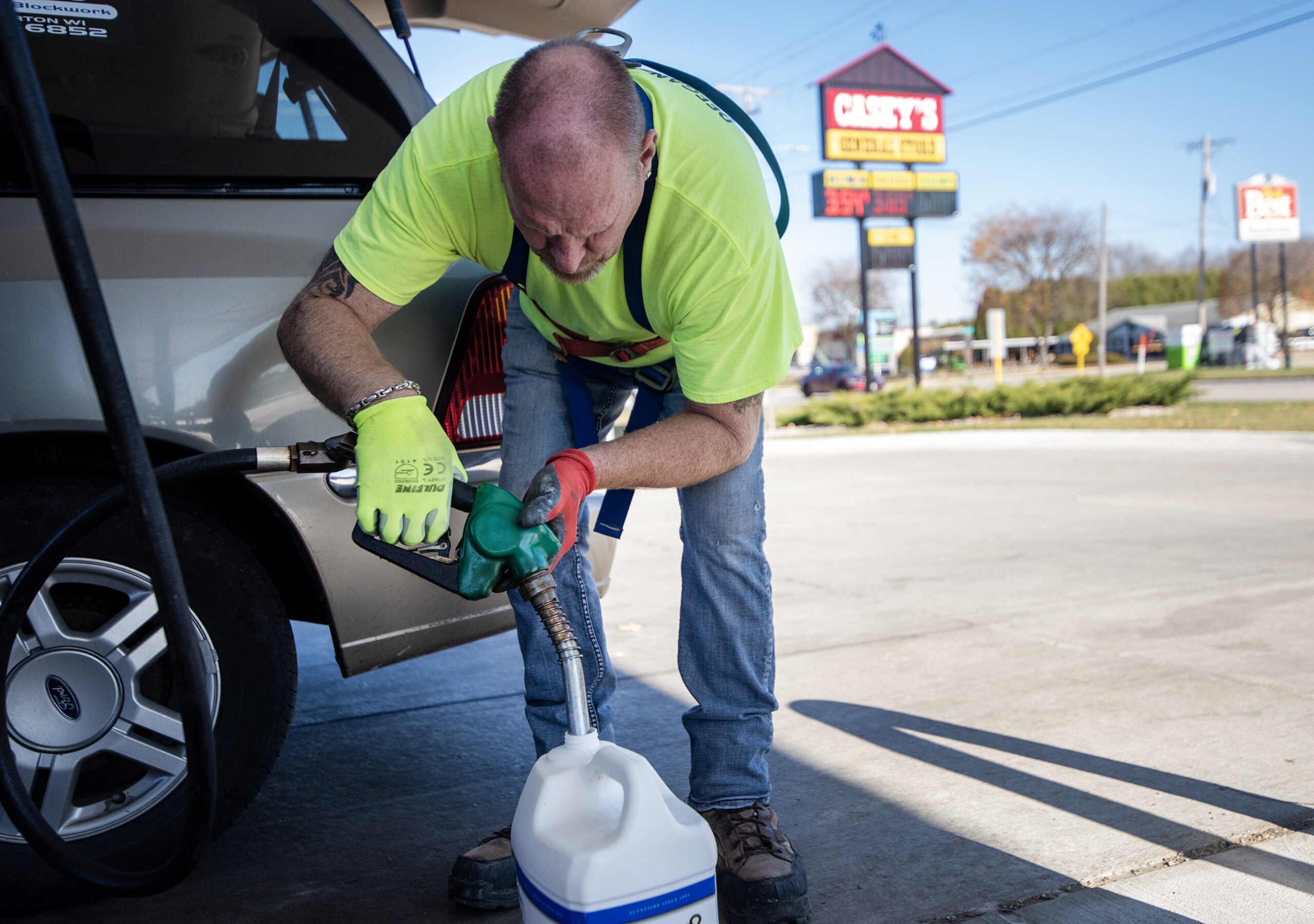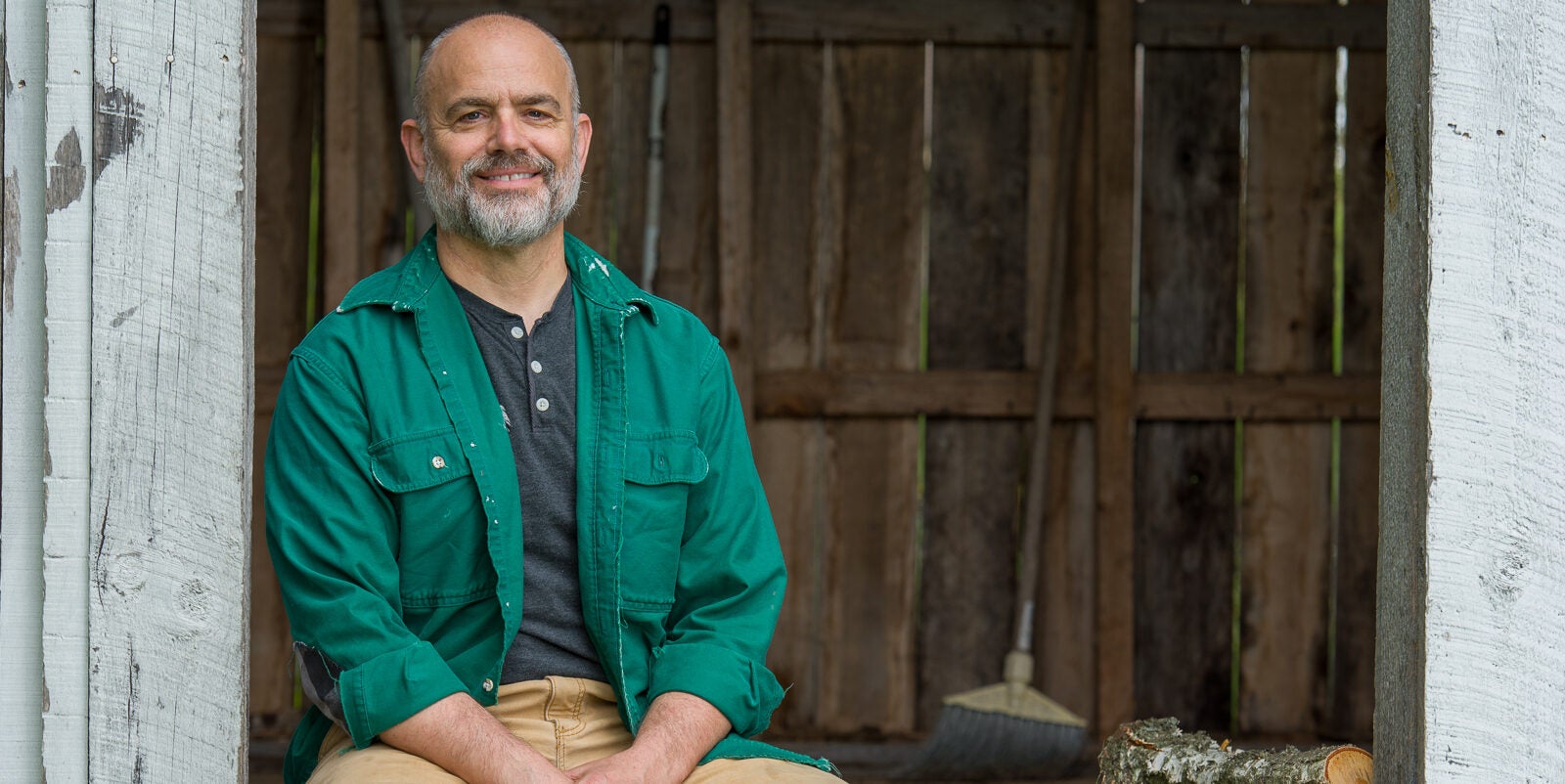As the new coronavirus pandemic upends life for many people in Wisconsin, the president of the Wisconsin Farmers Union says it has become more important for farmers to have access to mental health services.
Darin Von Ruden said the last five years of low commodity prices has taken a toll on producers, both financially and mentally. With milk prices plummeting, concerns are mounting. And he said it’s not easy for producers to seek counseling help.
“When you’re going bankrupt, it’s hard to go to the psychologists and say, ‘You know, I need help and I don’t have any money to pay you.’ So farmers don’t want to take that avenue on,” Von Ruden said.
News with a little more humanity
WPR’s “Wisconsin Today” newsletter keeps you connected to the state you love without feeling overwhelmed. No paywall. No agenda. No corporate filter.
[[{“fid”:”690421″,”view_mode”:”full_width”,”fields”:{“alt”:”Wisconsin dairy farmer Darin Von Ruden”,”class”:”media-element file-full-width”,”data-delta”:”2″,”format”:”full_width”,”alignment”:””,”field_image_caption[und][0][value]”:”%3Cp%3EDarin%20Von%20Ruden%2C%20president%20of%20the%20Wisconsin%20Farmers%20Union%2C%20at%20his%20dairy%20farm.%26nbsp%3B%3Cem%3EHope%20Kirwan%2FWPR%3C%2Fem%3E%3C%2Fp%3E%0A”,”field_image_caption[und][0][format]”:”filtered_html”,”field_file_image_alt_text[und][0][value]”:”Wisconsin dairy farmer Darin Von Ruden”,”field_file_image_title_text[und][0][value]”:”Wisconsin dairy farmer Darin Von Ruden”},”type”:”media”,”field_deltas”:{“2”:{“alt”:”Wisconsin dairy farmer Darin Von Ruden”,”class”:”media-element file-full-width”,”data-delta”:”2″,”format”:”full_width”,”alignment”:””,”field_image_caption[und][0][value]”:”%3Cp%3EDarin%20Von%20Ruden%2C%20president%20of%20the%20Wisconsin%20Farmers%20Union%2C%20at%20his%20dairy%20farm.%26nbsp%3B%3Cem%3EHope%20Kirwan%2FWPR%3C%2Fem%3E%3C%2Fp%3E%0A”,”field_image_caption[und][0][format]”:”filtered_html”,”field_file_image_alt_text[und][0][value]”:”Wisconsin dairy farmer Darin Von Ruden”,”field_file_image_title_text[und][0][value]”:”Wisconsin dairy farmer Darin Von Ruden”}},”link_text”:false,”attributes”:{“alt”:”Wisconsin dairy farmer Darin Von Ruden”,”title”:”Wisconsin dairy farmer Darin Von Ruden”,”class”:”media-element file-full-width”,”data-delta”:”2″}}]]
“More sectors of Wisconsin’s business communities certainly will be addressing this issue too. You know, as we get farther and farther into this and there’s no paychecks, people are starting to worry about whether or not they still have a house to live in,” Von Ruden said. “It certainly is affecting more than just farmers at this point in time. And so how do we address the total mental health of this state?”
State leaders on both sides of the aisle have been working to help farmers under financial stress this year — after the state lost 10 percent of its dairy farms in 2019.
Gov. Tony Evers called a special session of the Legislature to focus on farmers at the start of the year. Republican lawmakers have supported their own proposals, including grants for dairy processors and a bill to allow farmers to deduct the cost of their health insurance from state income taxes.
But Von Ruden and others in the agriculture community wonder if the response is enough to help farmers struggling with their mental health.
He said one helpful resource for farm families have been vouchers for free counseling sessions given out by the Wisconsin Department of Agriculture, Trade and Consumer Protection.
The Wisconsin Farm Center offers a crisis hotline where farmers can get financial counseling, management advice and the vouchers to redeem with a local counseling provider.
The program was created in response to the 1980s farm crisis, when producers struggled to pay off large amounts of debt amid poor commodity prices and low farmland values.
Senior agriculture specialist Kevin Plante said farmers in the ’80s struggled with their mental health in similar ways to today’s producers, but he said now more people see the need for professional help.
“We have more producers that are reaching out and that seem to be asking for help and recognizing, you know, it’s less of that stereotype of pull yourself up by your own bootstraps and you just deal with it,” Plante said.
The Farm Center gave out 182 counseling vouchers in 2019. By comparison, the program only issued around 26 vouchers in 2014 when milk prices were high.
Plante said the Farm Center has also been working to create new workshops to address the current issues facing producers.
[[{“fid”:”1214986″,”view_mode”:”embed_portrait”,”fields”:{“format”:”embed_portrait”,”alignment”:”right”,”field_image_caption[und][0][value]”:”%3Cp%3ESenior%20agriculture%20specialist%20Kevin%20Plante.%20%3Cem%3EPhoto%20couresty%20of%20Kevin%20Plante%3C%2Fem%3E%3C%2Fp%3E%0A”,”field_image_caption[und][0][format]”:”full_html”,”field_file_image_alt_text[und][0][value]”:”Senior agriculture specialist Kevin Plante”,”field_file_image_title_text[und][0][value]”:”Senior agriculture specialist Kevin Plante”},”type”:”media”,”field_deltas”:{“3”:{“format”:”embed_portrait”,”alignment”:”right”,”field_image_caption[und][0][value]”:”%3Cp%3ESenior%20agriculture%20specialist%20Kevin%20Plante.%20%3Cem%3EPhoto%20couresty%20of%20Kevin%20Plante%3C%2Fem%3E%3C%2Fp%3E%0A”,”field_image_caption[und][0][format]”:”full_html”,”field_file_image_alt_text[und][0][value]”:”Senior agriculture specialist Kevin Plante”,”field_file_image_title_text[und][0][value]”:”Senior agriculture specialist Kevin Plante”}},”link_text”:false,”attributes”:{“alt”:”Senior agriculture specialist Kevin Plante”,”title”:”Senior agriculture specialist Kevin Plante”,”class”:”media-element file-embed-portrait media-wysiwyg-align-right”,”data-delta”:”3″}}]]
The agency worked with the University of Wisconsin-Madison’s Division of Extension to create a program called “Unexpected Tomorrows,” where farmers can learn stress management techniques and share their experiences with depression, anxiety and loss. They also created a Farm Couples Weekend with workshops on improving communication.
Given all of these efforts, Plante said he feels DATCP has been responsive to the current needs of farmers.
“You’re not always able to do everything that you’d like to do … but you can definitely know that there is somebody available that they can work with,” Plante said.
Pandemic Limits Mental Health Services For Farmers
But the response has recently been impacted by the new coronavirus pandemic.
DATCP canceled the new workshops scheduled for this spring. A spokesperson said the agency is waiting to see what happens with the pandemic before deciding whether to reschedule.
Funding for the Farm Center’s programs has also been caught up in recent political fights.
Last summer, former DATCP Secretary-designee Brad Pfaff accused Republican leaders on the Legislature’s Joint Finance Committee of delaying funding for counseling vouchers.
The lawmakers argued they were waiting for recommendations from an Assembly task force on suicide prevention and accused Pfaff politicizing the issue.
“Unfortunately, it got a little political in discussion about who was actually interested in helping farmers more, which was, I think, unfair in the process of releasing these funds and making the recommendations,” said state Rep. Joan Ballweg, R-Markesan, chair of the Assembly’s suicide prevention task force.
The Joint Finance Committee approved the funding a month later, but the feud was part of what led GOP lawmakers to vote against approving Pfaff as DATCP secretary.
The suicide prevention task force led by Ballweg did propose nine bills last fall, with one bill specifically for farmers. The legislation would provide tuition assistance for producers to take college courses on farm management.
“One of the things that we wanted to look at was, how do we prevent people from getting in over their heads. For farmers, that means taking a comprehensive look at the finances and options that they’re looking at,” Ballweg said.
The bill was passed by the Assembly but has yet to be voted on by a state Senate committee.
Ballweg said the Legislature’s work on suicide prevention isn’t over. She would like to see DATCP expand their crisis hotline to be available 24 hours a day.
Von Ruden said he knows creating new programs takes time, but he worries some of this work is coming too late.
“Anytime that you hear that a farmer has committed suicide — and that’s happening too often in all sectors of agriculture right now — that means that we’re too late in that process. If we could have started this or been more aware of what’s going on earlier, maybe we could have helped,” Von Ruden said.
Rural communities in Wisconsin are moving ahead with their own efforts to address mental health.
Several counties have offered farm crisis programs and suicide prevention training for agriculture retailers, bankers and others who work with farmers.
Paula Winter, director of human services for Pepin County, said her department started looking for ways to help after almost 100 farmers came to a town hall meeting to talk about their financial and emotional struggles.
“It may not have been the mental health purpose of being there but really about their crisis they’re in,” Winter said. “As more people talked about how that impacted their mental health, then more were willing to stand up and say ‘Hey, me too. This is hard and we need some help.’”
In response, the county held a suicide prevention training for the agriculture community last November. Participants learned how to identify the warning signs of suicide and how to help someone having suicidal thoughts through the “Question, Persuade, Refer” method.
[[{“fid”:”1211011″,”view_mode”:”full_width”,”fields”:{“format”:”full_width”,”alignment”:””,”field_image_caption[und][0][value]”:”%3Cp%3EPepin%20County%20residents%20attend%20a%20farm%20suicide%20prevention%20training%20on%20November%2C%2019%2C%202019.%20%3Cem%3EHope%20Kirwan%2FWPR%3C%2Fem%3E%3C%2Fp%3E%0A”,”field_image_caption[und][0][format]”:”full_html”,”field_file_image_alt_text[und][0][value]”:”Pepin County suicide prevention training “,”field_file_image_title_text[und][0][value]”:”Pepin County suicide prevention training “},”type”:”media”,”field_deltas”:{“1”:{“format”:”full_width”,”alignment”:””,”field_image_caption[und][0][value]”:”%3Cp%3EPepin%20County%20residents%20attend%20a%20farm%20suicide%20prevention%20training%20on%20November%2C%2019%2C%202019.%20%3Cem%3EHope%20Kirwan%2FWPR%3C%2Fem%3E%3C%2Fp%3E%0A”,”field_image_caption[und][0][format]”:”full_html”,”field_file_image_alt_text[und][0][value]”:”Pepin County suicide prevention training “,”field_file_image_title_text[und][0][value]”:”Pepin County suicide prevention training “}},”link_text”:false,”attributes”:{“alt”:”Pepin County suicide prevention training “,”title”:”Pepin County suicide prevention training “,”class”:”media-element file-full-width”,”data-delta”:”1″}}]]
Tony Maas, a farmer from neighboring Pierce County, said he wanted to take the training to learn how to best support other producers in his community.
Maas is in his second year of farming and said his neighbors have started to open up to him.
“It’s not an easy thing to talk about it. It’s very personal and it’s hard to admit that you’re struggling. So yeah, I think it’s good to just learn more about how to speak to that and be a support to people,” Maas said.
Maas said he doesn’t think more government assistance is the answer to farmers’ mental health problems. He said rural communities need a culture shift.
“I don’t know that it’s up to our government to help us with it. It’s a community thing, where I think people need to be more involved in each other’s lives,” Maas said.
He said more people need to be willing to ask their neighbors about their mental health and be there when things aren’t going well.
Wisconsin Public Radio, © Copyright 2026, Board of Regents of the University of Wisconsin System and Wisconsin Educational Communications Board.




